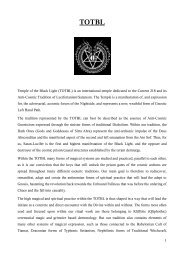Satanism Today - An Encyclopedia of Religion, Folklore and Popular ...
Satanism Today - An Encyclopedia of Religion, Folklore and Popular ...
Satanism Today - An Encyclopedia of Religion, Folklore and Popular ...
You also want an ePaper? Increase the reach of your titles
YUMPU automatically turns print PDFs into web optimized ePapers that Google loves.
Appendix III: Satanist Survey 335<br />
curse a truly “bad” person as it is to punish a lawbreaker,<br />
particularly in a society that <strong>of</strong>ten neglects to<br />
rein in abusers. Thus while there are undoubtedly more<br />
than a few immature Satanists who unthinkingly curse<br />
anyone who irritates them, for most, cursing is a kind <strong>of</strong><br />
vigilante justice, undertaken only as a last resort.<br />
Even if a ritual curse does not “work,” however, it<br />
can be a valuable practice, if only to vent one’s anger:<br />
“The positive effect <strong>of</strong> cursing is that it can be mentally<br />
healing for the magician by allowing her to dispel pent<br />
up negative energy toward a person.” This venting can<br />
be effective self-therapy even if it has no observable<br />
external impact: “My cursings have always had the<br />
secret motivation <strong>of</strong> being more effective on me, to get<br />
that nice avenged feeling without ever really knowing if<br />
the curse worked.”<br />
It should be noted in passing that my interest in<br />
negative public images <strong>of</strong> Satanists caused me to focus<br />
one-sidedly on destructive (cursing) magic. With the<br />
benefit <strong>of</strong> hindsight, I should also have asked about lust<br />
(love) <strong>and</strong> compassion (healing) magic. (In this regard,<br />
see Part 4 <strong>of</strong> LaVey 1969.) In other words, Satanic ritual<br />
magic has a much brighter side that my questionnaire<br />
did not address.<br />
Respondents themselves expressed concern about<br />
<strong>Satanism</strong> <strong>and</strong> the way it is perceived. Several people<br />
were concerned about the tendency <strong>of</strong> society to apply<br />
traditional stereotypes to modern <strong>Satanism</strong>: “Satanists<br />
DO NOT sacrifice virgins <strong>and</strong> drink blood <strong>and</strong> so on,<br />
<strong>and</strong> I hope <strong>Satanism</strong> will be taken seriously as a religion.”<br />
Perhaps the single greatest concern expressed<br />
was the alarming tendency <strong>of</strong> many Satanists to try to<br />
make <strong>Satanism</strong> into another clique: “Conformity as a<br />
movement can be a useful tool, given the need to<br />
mobilize ourselves for a task, but a lack <strong>of</strong> individuality<br />
<strong>and</strong> personal meaning is detrimental to the very<br />
essence <strong>of</strong> <strong>Satanism</strong>. Then the movement is not <strong>of</strong><br />
Satanists but rather one <strong>of</strong> angry sheep looking to<br />
reclaim their wool.”<br />
A rhetorical strategy <strong>of</strong>ten employed when Satanists<br />
criticize other Satanists is to accuse them <strong>of</strong> being<br />
crypto-Christians. Thus another respondent expressed<br />
concern over conformity within the movement in the<br />
following way: “I hate to see people praising the name <strong>of</strong><br />
Satan when to them it’s nothing more than some<br />
Picasso Christianity. <strong>Satanism</strong> is in the individual, <strong>and</strong><br />
to really be able to proclaim oneself a Satanist (the<br />
ANTITHESIS <strong>of</strong> Christian follow-the-leader tactics)<br />
they should be able to say ‘F**k Satan’ quicker than they<br />
get down on all fours <strong>and</strong> start singing Christian hymns<br />
backwards.” This concern spills over into the concern<br />
about the phenomenon <strong>of</strong> adolescent <strong>Satanism</strong><br />
(discussed earlier), which tends to create the impression<br />
that the movement is not a serious religion. “Many tend<br />
to view Satanic practitioners as troubled adolescents<br />
with poor education <strong>and</strong> family backgrounds. This is<br />
not necessarily the case . . . . Of course, the view <strong>of</strong> Satan<br />
as a rebel is a draw to most teens that dabble in <strong>Satanism</strong><br />
or ‘Reverse Christianity’ (the latter is most <strong>of</strong>ten the<br />
case), but these types tend to outgrown the fascination<br />
when they reach their twenties.” At its best, according<br />
respondents, mature <strong>Satanism</strong> is an attractive religion<br />
that, like all religions, provides a structure <strong>of</strong> meaning<br />
<strong>and</strong> enhances one’s life: “<strong>Religion</strong> is an integral part <strong>of</strong><br />
the human experience. There are people who can live<br />
without it, but I find the life <strong>of</strong> an Atheist rather sterile.<br />
<strong>Satanism</strong> gives me a connection to things greater than<br />
myself <strong>and</strong> opens a door <strong>of</strong> new sights, sounds, smells,<br />
ritual, art, music, <strong>and</strong> a connection with a tribal underculture.<br />
[Finally], <strong>Satanism</strong> provides me with a moral<br />
view <strong>of</strong> the Universe in which I live.”<br />
Conclusion<br />
As we noted earlier, the author <strong>of</strong> The Psychology <strong>of</strong><br />
Adolescent <strong>Satanism</strong> unwittingly praises <strong>Satanism</strong> for<br />
its empowering influence in the lives <strong>of</strong> confused young<br />
people. In fact, many <strong>of</strong> Moriarty’s observations about<br />
the first Satanist he encountered in his pr<strong>of</strong>essional<br />
practice dovetail nicely with the findings <strong>of</strong> this study,<br />
<strong>and</strong> it is perhaps fitting to bring our discussion to a<br />
close with one final citation from The Psychology <strong>of</strong><br />
Adolescent <strong>Satanism</strong>:<br />
[The young Satanist] presented himself with a<br />
sense <strong>of</strong> power <strong>and</strong> control that was eerie. He<br />
controlled the venting <strong>of</strong> his anger with the accuracy<br />
<strong>of</strong> a marksman. His targets were those in<br />
authority, most notably his parents. He knew<br />
exactly what he was doing. He also praised Satan for<br />
giving him this new lease on life. He reveled in this<br />
power. He practiced rituals that he thought gave<br />
him more power. His authority was The Satanic<br />
Bible. This kid was really different.<br />
Perhaps ironically, Moriarty has spelled out not only<br />
some <strong>of</strong> the factors that initially draw individuals to<br />
<strong>Satanism</strong>, but also some <strong>of</strong> the important reasons that<br />
they stay.<br />
One becomes a Satanist for much the same reasons<br />
as one joins any religion—to achieve a sense <strong>of</strong><br />
meaning, a supportive community, personal empowerment,<br />
<strong>and</strong> so forth. Sometimes these choices are impulsive<br />
or ill-considered, <strong>and</strong> many converts disaffiliate<br />
soon after joining. The majority who remain, however,<br />
eventually integrate their new religion into their<br />
personal identities as they mature in their “faith” (if I<br />
may be permitted to use this traditional term in the<br />
present context). <strong>Satanism</strong>, it turns out, is no exception<br />
to this general rule. Far from being confined to adolescent<br />
rebels, the data examined in this study indicates<br />
that many Satanists are reflective individuals who—<br />
despite the fact that youthful rebellion was <strong>of</strong>ten a factor
















